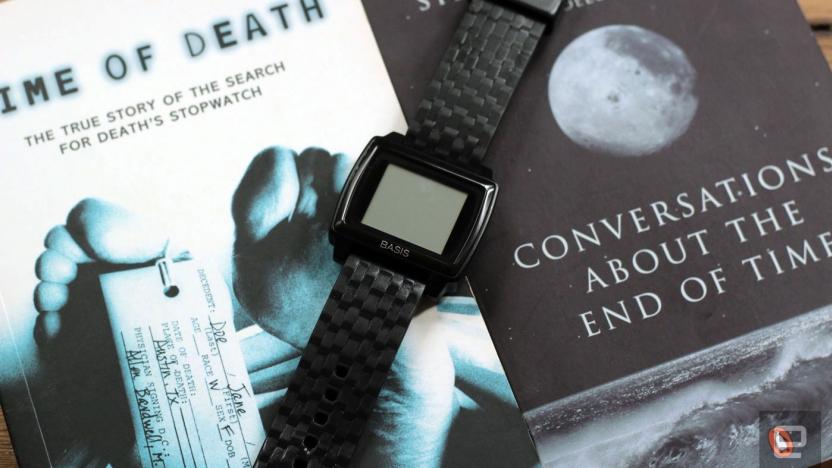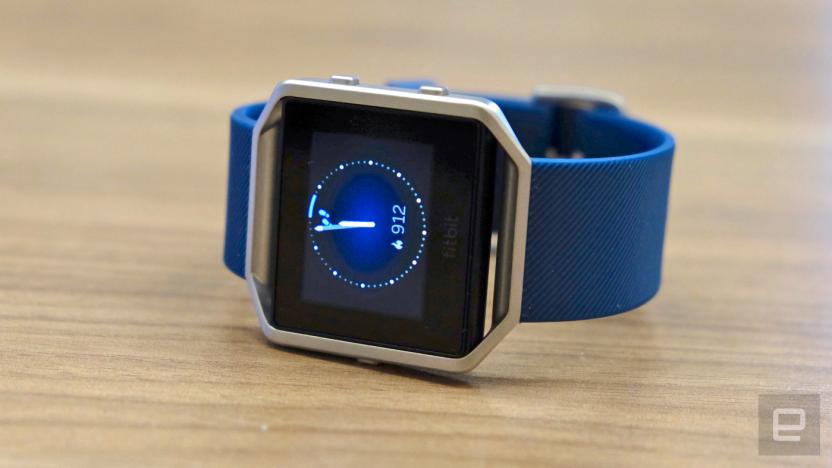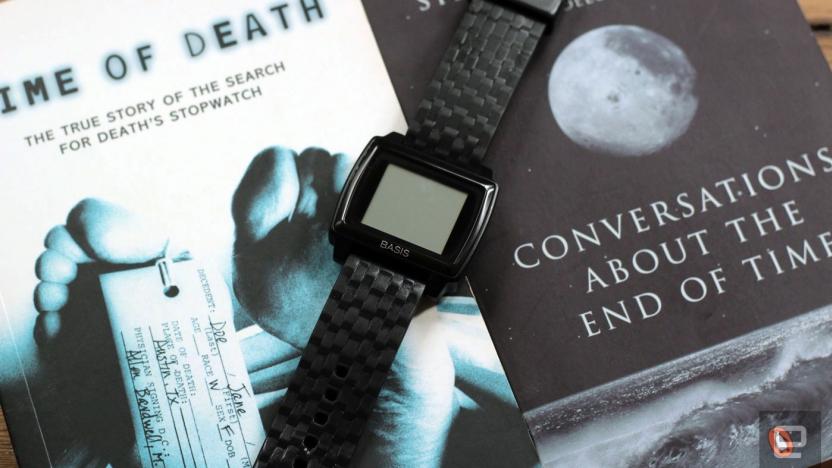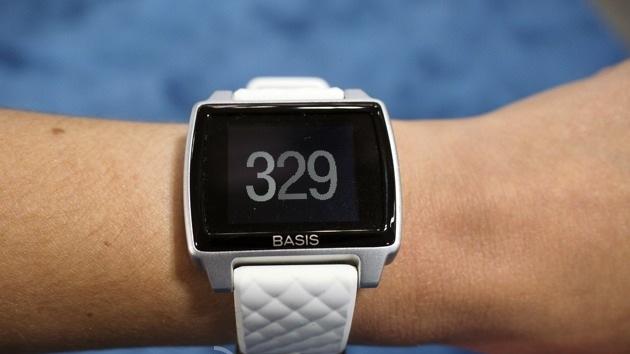basis
Latest

Intel reportedly killed its wearables division
When TechCrunch reported last year that Intel is getting out of wearables, the tech titan vehemently denied it. Now a new report by CNBC indicates that the company is indeed leaving the business behind: the publication says Intel has axed the whole division working on smartwatches and fitness trackers two weeks ago. The New Technologies Group, which is in charge of the chipmaker's cutting-edge businesses, has now reportedly shifted its focus to augmented reality. If true, this is the second project the company has scrapped in recent months: it also canceled the development its Raspberry Pi competitors in June.

I'm excited for Fitbit's mythical smartwatch
It hasn't been a great year for wearables, with sluggish sales and underwhelming products dominating the space. If the category had an Oscars-style 'In Memoriam' reel, it would feature several smartwatches that I loved deeply. For me, at least, devices from Apple, Samsung and Google that try to recreate the smartphone experience on the wrist just aren't compelling. But those companies want to be the only games in town after the demise of low-power companies like Pebble, Vector and Basis. That is why I'm hoping that Fitbit can swoop in and produce a smartwatch that people actually want to use.

Basis' wearables are (probably) dead
When you're sitting across from Dr. Jerry Bautista, the vice president of Intel's wearables division, you have to ask about Basis. After all, Intel has been weirdly quiet about the fate of wearables startup it bought, especially after recalling the Basis Peak due to overheating concerns. Bautista wouldn't give a definitive answer about the future of the brand, but from what he didn't say, it's clear we'll never see a new Basis device.

Intel is reportedly backing away from wearables (update: it says no)
When Intel bought Basis back in 2014, there were hopes the acquisition would push the wearables firm to the next level. Sadly, things didn't go that way -- the company's first Intel-backed product had a tendency to catch fire, and was subsequently pulled from the market earlier this year. Now, any hope for a bounce back has been all but extinguished: according to a report from TechCrunch, Intel's wearable division is facing massive layoffs.

RIP Basis Peak: The best wearable you've never heard of
If you don't already own a Basis Peak, then you'll probably never get the opportunity to see one up close and personal. The wearable has barely registered in market-share metrics but has suddenly made a name for itself after being recalled. Which is a shame, because history is likely to remember it as that watch that caught fire and burned its owners. That would be an enormous disservice to a gadget that's one of the most seriously underrated wearables on the market.

Basis recalls Peak smartwatch for burn risk from overheating
Back in June, Basis stopped sales of its fitness-focused Peak smartwatch following reports that the wearable was overheating. Today, the company issued a recall for the device, citing the risk of burns or blisters due the device running hot. When it first acknowledged the issue, Basis said it was working on a software update that would remedy the temperature problem and urged customers not to use the wearable until a solution was in place. However, the company revealed today that "despite our best efforts," it couldn't find a fix that wasn't detrimental to the overall user experience.

Basis halts Peak smartwatch sales due to overheating concerns
When we first reviewed the Basis Peak back in 2014, we noted the wearable's ability to track your activity while lacking some core smartwatch features. The company has continually added new features to the device, but today it announced that sales have been halted. Citing the wrist-worn gadget's tendency to overheat, Basis is putting sales of the Peak on hold until it can issue a software update to remedy the issue. What's more, it's recommending current owners avoid using the device until that patch is released.

Basis' fitness tracker now comes in titanium, talks to other health apps
As useful as the Basis Peak may be for tracking your fitness, your data has largely been trapped so far -- you couldn't see it outside of Basis' own apps. However, you'll be glad to hear that things are loosening up. An app update rolling out to the Peak today will share the wristwear's activity data with either Apple's Health app or Google Fit, so you get a more complete picture of your health. If you only strap on your Peak when you're running, for instance, you can still merge its info with the walking data your phone collects. It'll also open a "Playground" for testing app features (such as an activity map and a Photo Finish selfie recorder) before they're available to everyone elseShould that not be enough, there's a firmware update coming on May 20th that will add a stopwatch and improve heart rate monitoring.

Basis' Peak fitness watch now gets notifications from your phone
A little later than promised, Basis' Peak fitness tracker behaves more like the smartwatch it arguably should have been all along. Grab a newly released update for the wearable and it'll give you a heads-up on calls, meetings and messages from your Android smartphone or iPhone. It's not as sophisticated as most smartwatches (even less expensive devices like the Pebble will show much more), but it should make sure that you aren't caught unawares when a friend texts you in mid-workout.

Basis Peak to get its smartwatch-like features in December
In our recent review of the Basis Peak, we pointed out its potential to be a pretty good smartwatch, just as it is a fitness tracker. And, thanks to a firmware update set to arrive next month, Basis, which is now owned by Intel, will be making its wearable better than it already is. Around mid-December, the Basis Peak is going to begin supporting notifications from Android and iOS devices, including those that come from your calendar, text messages and phone calls. While you'll have to wait for those smartwatch-like features to come to the Peak, something new that's available now is the ability to share your heart rate data with third-party fitness apps via Bluetooth. What's more, the Basis Peak is expanding availability outside of the US, to Canada and the UK in the middle of December as well -- Basis says international pricing will vary depending on the region.

Basis Peak review: a good fitness tracker, with room to be a good smartwatch
Jawbone. Fitbit. Microsoft. And now... Basis. If you don't know much about the brand, you really should get up to speed: The company quietly put out one of the best fitness trackers, and now it's a part of Intel. Which means, it's officially one of the big names in health gadgets. Like the previous-generation B1 band, the new Basis Peak can automatically detect when you're exercising or asleep, making it one of the most automated fitness trackers around. This time, though, it brings a sharper design, a redesigned app and an improved sensor that can track your heart rate when you're working out, as opposed to when you're just sitting still. What's more, it will eventually be able to display smartwatch-like notifications on its 1.25-inch touchscreen, at which point it'll be way more versatile than your typical fitness band. Like before, the Peak costs $200, meaning it's still one of the more expensive fitness trackers on the market. As you'll see, though, I'm not sure that's a dealbreaker.

Basis unveils its first fitness tracker since getting acquired by Intel
You probably mainly think of Intel as the company trying to make 2-in-1s happen, but lately it's been dabbling in fitness, too. It all started when the chip maker acquired Basis, the creator of what was quite possibly the most sophisticated fitness wearable on the market. Intel promised it'd make it even smarter. Or something. Now, six months later, Basis is introducing the Peak, its first fitness tracker since joining Chipzilla. And it is indeed a bit smarter. Mostly, though, it's just a better-designed device.

Intel buys maker of the Basis Band, promises smarter wearables
Well, it's official. In a bid to boost its wearable clout, Intel confirmed today that it bought Basis Science, the startup behind the fitness-friendly Basis bands. The deal reportedly cost Intel a cool $100 million (according to TechCrunch, anyway), which neither company was keen to mention aloud. According to a post on the official Basis blog, the team will join Intel's Devices team to help flesh out the chipmaker's wearable future.

A closer look at Basis' new, more comfortable fitness band (hands-on)
Basis' new fitness band, dubbed the Carbon Steel Edition, is much more comfortable than the original. And that's not just me parroting the company's marketing materials: I've been testing the original B1 band for weeks now, so I should know better than anyone how much better this new one is. Though the press materials would make it seem like this is basically the old B1 with a new wristband, it's now covered in chrome accents (can you really call a faceplate an "accent"?). So, while the overall shape remains the same, and though the screen still has a touch-sensitive pins in each corner, it has a more premium look than it did before. It's no Pebble, to be sure, but it's nonetheless a step in the right direction. Even without that metal overcoat, though, this would have been a big improvement if only thanks to the wristband. In brief, it has a much softer finish than the rubbery plastic used in the B1. It rests more comfortably against the skin, and is stretchier too, allowing for a snugger fit. Even some retooled hinges allow the band to curl around your wrist a little more naturally. I can't overstate how important that is: right now, I barely even take advantage of the B1's sleep tracking capabilities because by the time bedtime rolls around, I've grown weary of having an uncomfortable band strapped to my wrist.

Basis intros 'Carbon Steel Edition' fitness band with improved design; old model drops to $179
By all accounts, the Basis B1 is one of the smartest fitness trackers on the market: It monitors sweat output, heat dissipation, blood flow and heart rate. And, as of a recent update, it can automatically detect when you've started walking or running. Still, smart doesn't mean much when the watch isn't comfortable to wear or -- worse -- when it resembles a Casio watch from the '80s. Accordingly, then, Basis just announced a new model, the Carbon Steel Edition, which comes in direct response to early user feedback, according to company reps. For starters, the new band has a sleeker look, complete with chrome accents. It also features a stretchable silicone strap that's more flexible and breathable. That's available today for $199, while the original B1 band is getting a price cut to $179. Meanwhile, even if you've already splurged on the B1, you'll be happy to know that Basis is rolling out some new sleep-tracking features for both the B1 and the new Carbon Steel Edition. In short, the two bands will be able to differentiate between REM, deep and light sleep. And, just like with the activity tracking, this will all happen automatically, so that you won't have to press a button to put the device into sleep-tracking mode. Also, you'll be able to see a "personal sleep score" inside the app itself, though you'll have to wait for an update first -- that should hit the Android, iOS and web applications later this month, on January 21st.

Basis fitness tracker can now detect when you're moving, tally up the calorie burn (video)
Is there anything more delightful than a product getting new features months after you bought it? Thanks to a firmware update rolling out today, the $199 Basis fitness band can now automatically detect when you're moving -- and calculate the calorie burn accordingly. In particular, the watch knows when you're walking, running or biking without you having to press a button or enable some sort of activity mode. And that makes sense, when you think about it: one of the Basis band's original defining features was its ability to tell when you'd gone to sleep. As you'd expect, you'll be able to pore over all this data using either the web console or one of the company's mobile apps (the Basis band already tracks vitals like sweat output, heat dissipation, blood flow and heart rate). Additionally, Basis also added running and bicycling "clubs (for lack of a better word), to help you get into the habit of doing these things more often. If you've already got a Basis tracker in hand, you'll need to take the device off your wrist just long enough to download the software update over USB. Check it out and let us know how it goes.

Basis Band Android app finally available, iOS version still absent (video)
If you've been sitting around not clocking up the miles with your Basis Band, we imagine it's because you were waiting for that long-delayed mobile app. Well, it might not be Q1 as promised, but it's finally time to lace up those sneakers. It's team Android that gets out of the blocks first, with the app debuting on the Google-flavored OS. Features include automatic sync, the ability to see your current progress towards your activity (aka habits,) plus, of course, lots of historical data. Think you set your goals too high? Too low? No problem -- you can edit said habits direct from the app, drill down to show more detail, and get notifications or reminders about how well you're (not?) doing. The app is free, and while Android might have the head start, we're told the iOS version isn't far behind, so iPhone owners might want to start limbering up now. In the meantime, those with green stripes can head to the source for the goods.

Basis fitness tracker gets an Android app, to be available in Q1; iOS version still in the works
We'll say this about Basis: no one can accuse it of rushing products to market. It was a whole year ago back at CES 2012 that the company first announced its fitness band, which only just went on sale six weeks ago. It's a pretty promising device, actually, with sensors that track sweat output, heat dissipation, blood flow and heart rate. Unlike other fitness trackers, too, it can automatically detect when you're asleep or working out, so that you don't have to log that information manually. The problem is, there aren't yet any mobile apps, meaning you have to view all your data through a web console. Well, we have some good news: the company just released screenshots of its Android app, which fortunately has the same clean UI as the website. The bad news: it won't actually be available to download until later in Q1, and the iOS version is still in development. For now, here's a little preview of what you can expect. The "Insights" feature gives you a daily summary, with everything from sleep quality to resting heart rate to calories burned. If you like, you can scroll through the days or view your progress in one-week increments, though a Basis rep hinted monthly and yearly views might be added later. Additionally, you can page through so-called habit cards, which keep tabs on how well you're sticking to a healthy routine, doing things like getting up from your desk and moving around. As we said, the app will be available on Android by the end of Q1, following a period of beta testing. If we can catch a demo here at CES, we'll update this post with a short hands-on video but for now, help yourself to some screenshots below. Follow all the latest CES 2013 news at our event hub.

Basis fitness tracker finally goes on sale for $199, mobile apps still MIA
Remember the Basis Band, that fitness-tracking wristband that was supposed to come out earlier this year? Well, the company obviously missed its target for an "early 2012" launch, but it's been busy refining the product and publishing intermittent blog posts to let people know how the device has been shaping up. Well, at last, it's ready for prime time: the band is on sale today, priced at $199, as originally planned. In case you're just hearing about Basis for the first time, here's a quick recap: unlike Nike Fuelband and other devices aimed at athletes, Basis is attempting to lure in more mainstream users with the ability to set goals and get rewarded for staying on track. (Other devices, including the new Jawbone Up, do this too.) What's interesting, though, is that for a device that claims to target the everyman over the nerd it actually collects an impressive amount of data. For instance, the "Patterns" view in the web console will show not just how many steps you take throughout the day, but which hours of the day you were most active. The band, meanwhile, tracks sweat output, heat dissipation, blood flow and heart rate -- something we can't say about all those other fitness trackers. As for the UI, the site itself is visually pleasing, though some mobile apps would also be nice. (A Basis rep says they're working on it.) If anything, the product's simplicity comes from the hardware: it uses Bluetooth 4.0 2.1 to transmit all your data to the cloud so that you don't have to sync over USB. Basically, between that and those various sensors, the band should theoretically detect when you're sleeping or exercising so that you don't have to switch modes or enter any information manually. It's worth noting, though, that other fitness trackers mainly stumble when it comes to logging food intake -- something sensors can't detect -- and that's not even something the Basis band covers right now. In other words, it's easy to praise a device for working automatically when it completely bypasses the whole diet piece of the wellness equation. According to Basis, research suggests people don't really use these food-logging tools anyway. We can believe that, actually, though for $199 it would be nice to at least have the option, no? That's another thing: at two hundred bucks this is considerably pricier than competing devices, including the Up band ($129) and the new Fitbit One ($100). Even so, the user experience is everything, isn't it? If you've ever been food-judged by Up, or if the Basis band really is as low-maintenance as it seems, it could still be worth a gander.

Basis unveils web dashboard for Basis Band health tracker, makes it easy to see how unhealthy you are
The Basis Band is a health tracking watch with optical sensors that track your heart rate, an accelerometer to see how active you are, galvanic skin response to measure your perspiration, plus ambient and skin temperature sensors. All that data gets run through a few Basis algorithms to create a picture of your health that's displayed in the handy-dandy web portal you see above. The dashboard is meant to make your data digestible so you can create (and meet) your health goals, and there's both game mechanics and social media integration to keep you motivated. Of course, you can access the raw data if you're into tracking pulse rates and perspiration levels. We got a chance to speak with company CEO Jeff Holove about Basis, and he said it's meant to enable the every man to track his health during regular daily activities -- as opposed to similar products from Garmin and Polar that are aimed at athletes. If that sounds good to you, the Basis Band comes out in "early 2012" for $199, and the cloud service will be free for those who buy in. PR and a video are after the break.









